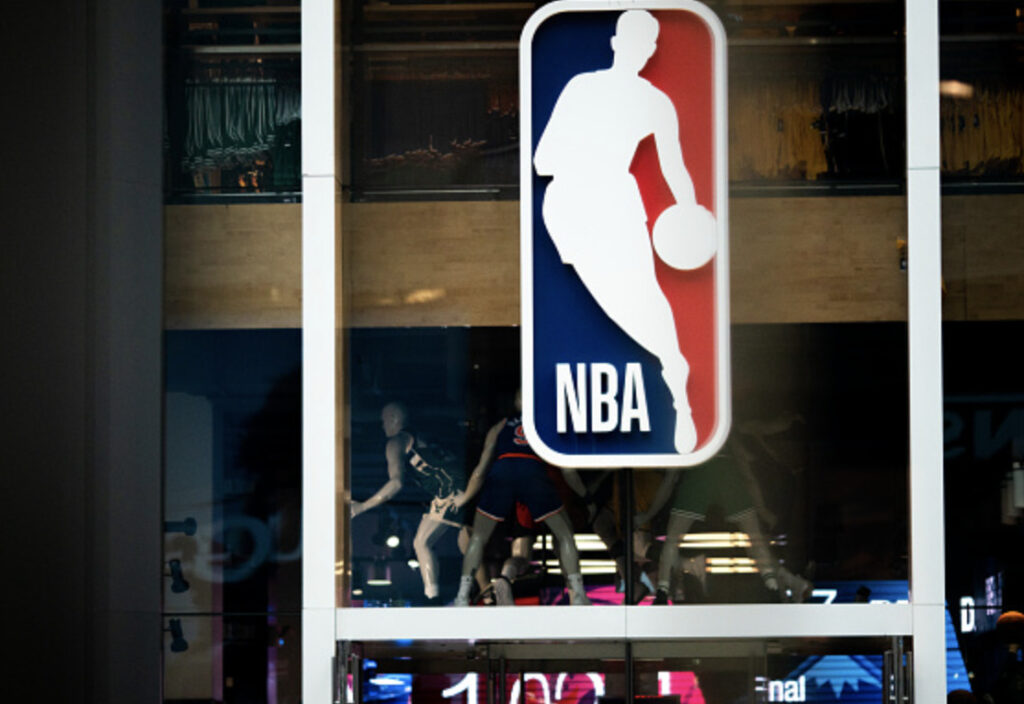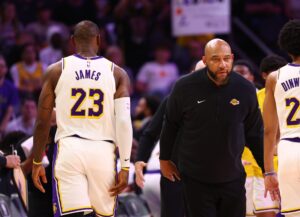We’re inching closer to the NBA postseason and the second NBA play-in tournament.
With March Madness upon us, we become captivated by the chance of shocking upsets in a single-elimination format. Despite the long odds of a 15-seeded St Peter’s defeating a second-seed Kentucky, we tune in to watch. And when the near-impossible happens, we’re reminded why the NCAA Tournament is one of the most exciting sports events of the year.
The NBA is trying to capture similar magic with the play-in tournament. Once again, 10 teams from each conference will qualify for the postseason.
Here are three reasons why the NBA play-in tournament is flawed.
Three Flaws with the NBA Play-In Tournament
1. The NBA is Rewarding Mediocrity
The NBA regular season is a grind. There are usually teams that come on strong late in the year and either snatch the #8 seed or fall just short. That push alone already raises the stakes – and ratings – in March and April. During an 82-game regular season, teams have 82 chances to win enough games to qualify for the playoffs. This seemed to work just fine. Until it didn’t.
Last season, the regular season was shortened to 72 games. By eliminating 10 regular-season games, the NBA rightfully wanted to keep teams making those late-season runs – and their fans – invested in the NBA product. The 7-10 seeds in the East – the Boston Celtics, Washington Wizards, Indiana Pacers, and Charlotte Hornets – all finished the regular season at .500 or worse. In the West, the 10th seeded San Antonio Spurs qualified for the postseason with a losing record (33-39).
If the regular season ended today, 4 teams who would qualify for the play-in tournament as the 9 & 10 seeds in each conference – the Los Angeles Lakers, New Orleans Pelicans, Hornets, and Atlanta Hawks – all currently sit at .500 or worse. Why is the NBA rewarding mediocrity?
Teams who “survive” the play-in tournament are awarded the 7th and 8th seeds in their conference. Exactly zero 7th and 8th seeds have ever won an NBA title. It seems fraught to build anticipation around the play-in tournament when the teams who qualify for it have been largely mediocre all season. Especially if – historically speaking – they have no shot at competing for a championship.
2. Rewarding Mediocrity Dilutes the NBA Regular-season Product
The Lakers currently sit 10+ games under .500. If the season ended today they would qualify for the West’s play-in tournament as the 9th seed. Despite the Lakers’ ineptitude, LeBron James has the league’s top-selling jersey. Financially speaking, it’s great for the NBA if the Lakers are in the playoffs. But does a team that loses 40 of their first 69 games really deserve to be in the postseason? If so, why should fans be invested in an 82-game season? The league is already considering ways to address this.
Last year reports surfaced of a mid-season tournament, aimed at capturing more public interest during a time when NBA ratings are generally at their lowest. While conceptually exciting, it’s still unclear how a mid-season tournament in the NBA might impact playoff seeding and eligibility. In college hoops, mid-major programs with losing records can earn automatic bids to the ‘big dance’ by winning their conference tournaments. Would the NBA award the Detroit Pistons – more than 30 games below .500 – an automatic playoff birth if they miraculously won the [proposed] mid-season tournament? Probably not.
Keep this in mind: In the Eastern Conference, the Detroit Pistons trail the top-seeded Miami Heat by 28 games. In the Western Conference, The Lakers trail the top-seeded Phoenix Suns by 28 games. Neither of these teams has performed well enough during the regular season to deserve a postseason birth. But because of the play-in tournament, the Lakers will earn one. If the NBA wants to reward mediocrity, at least do it equitably.
3. Impact of the Play-In Tournament on NBA Draft Lottery Odds
The NBA draft lottery rules are determined by regular-season record, but the current system weighs the 2 potential play-in games heavier than any 2 regular-season games. Last season the Golden State Warriors finished the regular season with the 15th best record in the NBA. After dropping two consecutive games in the play-in tournament and missing the playoffs they were awarded the 14th pick in the draft.
The Wizards finished last season with 5 fewer regular-season wins than the Warriors. Washington, however, won both of their play-in games. They advanced to the first round of the Eastern Conference playoffs and lost to the Sixers 4-1. Despite having five fewer regular-season wins than the Warriors, the Wizards picked one spot behind Golden State in the draft. Flip-flopping one spot in the middle of the first round may not appear too significant. It does, however, demonstrate how the weight of the play-in tournament can have a disproportionate impact on draft odds.
The NBA should adapt the draft-lottery format to properly weigh regular-season performance. The 10 teams who don’t qualify for any postseason action should be locked in with top-10 draft odds based on the regular-season record. The four play-in teams who don’t advance to the first round should be reseeded 11-14 according to their regular-season record.
The NBA Play-In Tournament is Flawed
The play-in tournament rewards mediocrity and complicates the draft lottery odds.
The NBA either needs to solve the issues with the play-in tournament or lean into it even more.
As March Madness sweeps the nation, would the NBA consider creating a 30-team end-of-season single-elimination tournament to crown a champion? Probably not – but we’d watch it if they did.
Main Image: Embed from Getty Images






